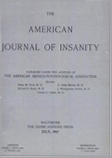Abstract
(1) The tuberculosis mortality rate for patients in the Ontario mental hospitals has shown some tendency to decrease since 1934, yet in 1936, this rate was 14 times as great as that for the Province as a whole.
(2) From May 1937 to May 1938, a survey by chest X-ray films upon more than 13,000 mental hospital patients in Ontario (excluding 1.7 per cent already under treatment for tuberculosis at the beginning of the survey) revealed:
(a) 1.3 per cent—pulmonary tuberculosis, definitely active—requiring immediate treatment.
(b) 4.1 per cent—pulmonary tuberculosis, activity undetermined—requiring isolation pending investigation.
(c) 1.3 per cent—X-ray shadows strongly suggesting tuberculosis—requiring isolation pending investigation.
6.7 per cent—significant pulmonary lesions—requiring isolation
(d) 7.0 per cent—pulmonary tuberculosis, definitely or probably arrested— requiring only casual observation—not isolated.
13.7 per cent—total showing definite or suggestive evidence of parenchymal pulmonary tuberculosis.
Note.-It is estimated that at least one-half of the patients in groups (b) and (c) will prove to require treatment in a tuberculosis mental hospital or unit.
(3) Approximately 2.5 per cent of 2908 patients admitted to the Ontario mental Hospitals during the calendar year 1938, required isolation because of chest X-ray findings.
(4) A second chest X-ray survey already completed one year after the initial survey at five hospitals with 6ooo patients, showed 110 patients to require isolation who had previously shown normal chest X-rays. Of that number, ten had moderately or far advanced pulmonary tuberculosis, indicating the necessity for repeated "combing" by chest X-rays of the patient population.
(5) From the tuberculosis situation as it existed in January 1939 (nine years after commencement of some anti-tuberculosis work, and 1½ years after commencement of the present complete program), it was estimated that a central tuberculosis mental hospital would be required to accommodate approximately 5.2 per cent of the patients in Ontario mental hospitals.
(6) A chest X-ray survey of 2542 staff in the Ontario mental hospitals in 1937-38, showed 0.6 per cent to require treatment for tuberculosis. Since 1933, approximately 0.5 per cent of the employees have required treatment for tuberculosis each year. Of all members of staff, 21 per cent were negative to tuberculin, while among the undergraduate nurses 74 per cent were negative tuberculin reactors.
(7) Of 22 members of staff requiring treatment for tuberculosis where the tuberculin reaction on entering their hospital employment was known, 18 had negative reactions which subsequently became positive, followed (in all these cases within six months) by X-ray evidence of the disease.
(8) Approximately 1.7 per cent of 839 apparently healthy staff applicants or new staff in the Ontario mental hospital service during the calendar year 1938, showed X-ray evidence of pulmonary tuberculosis which was active or possibly active, therefore rendering them not acceptable for employment.
(9) It is believed that an increasing interest will be evident at all hospitals in the control of tuberculosis among their patients and personnel. In mental hospitals this work is particularly advisable. Half-way measures are inadequate to cope satisfactorily with the tuberculosis problem in such hospitals. Only by a complete program of routine case-finding by X-ray examinations and modern treatment of diagnosed cases, can one feel satisfied that the situation is under irreproachable control.
Note.-Appreciation is gratefully acknowledged to Dr. B. T. McGhie and Dr. G. C. Brink, whose continued interest has been a most important factor in the development of the work upon which this paper is based. Acknowledgment is also made for the assistance of Dr. J. J. Weber, Dr. F. T. Fralich, and Dr. 0. V. Dent of the T. B. unit at the Ontario Hospital, New Toronto, who interpreted many of the films and gathered the data for certain tables presented. The superintendents of the Ontario mental hospitals have cooperated in this work and to them and their medical staffs, appreciation is expressed.

